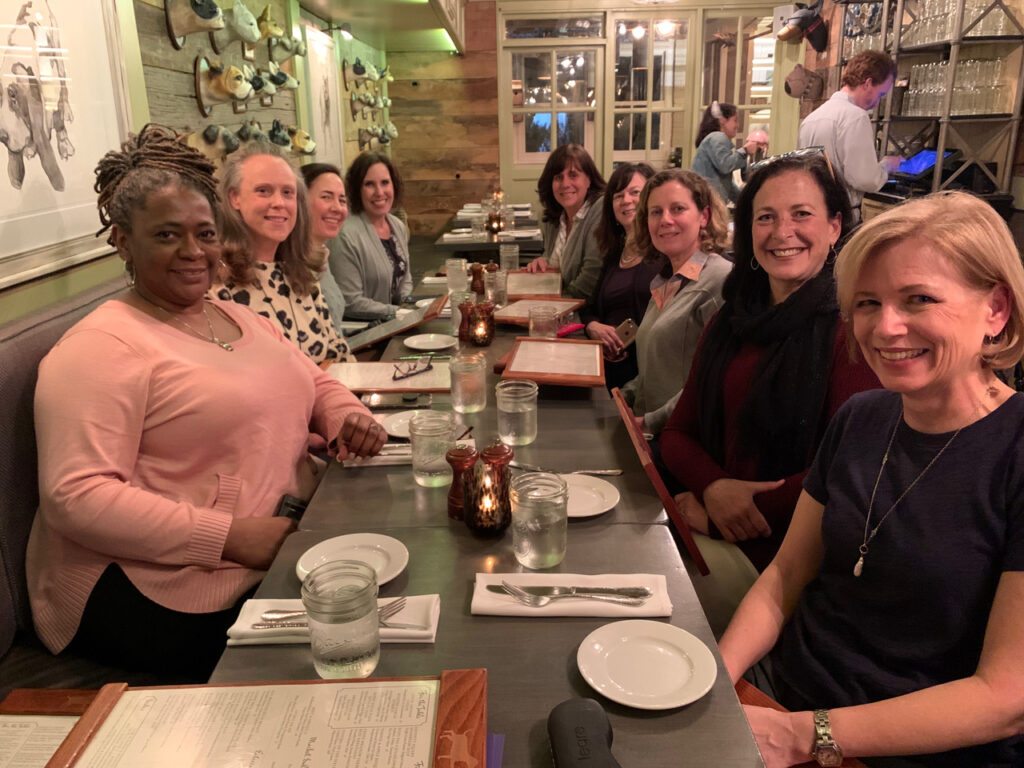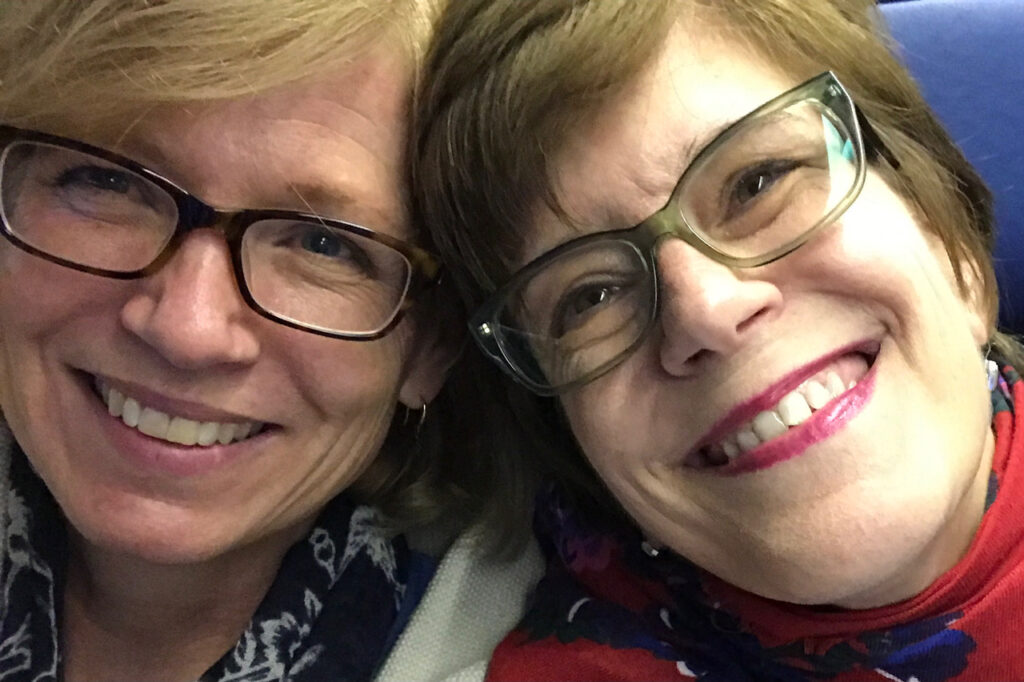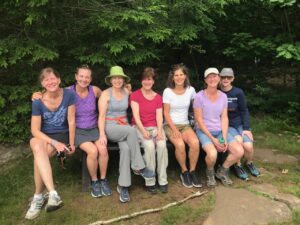Project BFF sat down author Lydia Denworth to talk about the friendships in her life.
Project BFF: Tell us a memorable experience with a friend when you were younger. Why has that always stuck with you?
Lydia: There are quite a few. One I’ll share, I think because I’m back in my hometown of Philadelphia. My closest friend when I was in about sixth grade was a girl named Georgia. She lived in an apartment right up the street from me, and we used to spend all our time at her house, we would make brownies and we would lie on the floor and listen to Earth, Wind & Fire. I just have such a visceral memory, of the lying on the floor, listening to the music. I think I remember it because it was that really lovely, strong, early kind of relationship.
We then went to separate schools and stayed in touch over the years, only vaguely, and now in our 50s, we are seeing more of each other because she’s still here in Philadelphia, and I’m back here because my mother is not well and I come back and forth more. Actually in the last two weeks, I’ve seen her a couple of times, and it’s been really lovely to reconnect and we were laughing about Earth, Wind & Fire. We were reliving all of those strong childhood memories. Our conversation made her want to make brownies again. I, on the other hand never gave up making brownies. I’m a pro, and I think everyone needs brownies in their lives.
Project BFF: Social media was touted as a way to keep us connected. What is the impact you see that it’s had on friend relationships?
Lydia: For me, social media has been mostly a positive. I am the kind of person who does stay connected to people over the years, though not everyone to the same degree. I have heaps of friends on Facebook, and I very much know the difference between my closest friends and my Facebook friends. There are people there that I haven’t seen in person in years and wouldn’t recognize probably, but they are also people that I feel quite connected to.
I think social media has been a way to stay in sporadic touch with people from various points in our lives. My book Friendship came out in January of 2020, and six weeks later on the world shut down. But for those six weeks, I travelled the country doing book events. A whole heap of my high school friends came to an event in Philadelphia, and we all went out to dinner after. That would never have happened without social media. The book tour was like a rolling reunion, and social media really facilitated that. Yes, they wanted to come out and support me, but also it was a way for them to all get together, and I like that part of it.
What the science tells us is that if we use multiple ways to connect with people—if we’re friends with someone on social media, also see them in person, and talk to them on the phone or things like that—those are going to be our strongest relationships. Some of my very closest friends are not on social media, and that’s totally fine. We text and call and email and see each other in person when pandemic allows it. I’m someone who has to be on social media because of my job, what I do requires me to be a somewhat public person, and some of my friends are the opposite and they don’t want to be public. I do sometimes find it’s funny, because there are things about my life that my friends who aren’t on social media don’t know that I just assume everybody knows.
Social media is what you make it, and it’s important to not just take it in. The healthiest way is to interact, because if we’re passively scrolling and watching the world go by you can get more of a sense of loneliness or fear of missing out. Being proactive about it and being engaged and active, not passive, is the way to go.
The pandemic changed everything. We needed technology and social media more than ever. I happen to be someone who thinks that a lot of the fears of what social media has done to our social lives are overblown. That doesn’t mean there is no problem, but the most rigorous, most recent science really says that social media is not nearly as terrible for us as people believe, and that it can in fact be good, especially for relationships.

Project BFF: Why do you think that content and resources about friendships among women is important in today’s world?
Lydia: Well, I spent five years working on a book about friendship, so obviously, I believe it’s important. What I found is that a lot of people think they know all about friendship; it’s so familiar that we kind of take it for granted.
Historically, a lot of people have thought that friendship was more cultural than anything else, that it was kind of a pleasant by-product of civilization and language. Much of friendship is cultural, but it is also deeply biological, and it is part of our evolutionary story. Understanding that helps us give it the respect it is due in our lives; and by that I mean really working at it and focusing on it and giving friendship the time that it needs.
Two things are true about friendship. First, there are real evolutionary advantages to being good at making and maintaining friends. Secondly, over the long haul, friendship is as important for your health as diet and exercise, and so you do yourself a great disservice if you don’t hang out with your friends.
Loneliness has a real effect on everything—cardiovascular functioning, our immune system, our cognitive health or mental health, stress responses, sleep, and even the rate at which our cells age. Biologically, we age faster if we are lonely. That should make everybody sit up and take notice.
Do not cancel on your friends, make your friends a priority. Obviously, there are times in life, especially for women in their 30s and 40s, if they have a family or a career or both, when people are overwhelmed and pressed for time. I get that because I’ve been there. But even during those busiest times of our lives, we should make space and time for friends to whatever degree we can. The science of friendship gives you permission to hang out with your friends. I love that friendship is as good for you as going for a jog.

Project BFF: Do you feel like you have a best friend(s)? If so, what makes you say that?
Lydia: I have a handful of best friends; one of them in particular is Moira. We worked together in the 1990s in London for People magazine. I thought she was really funny and we just connected and have been super close friends ever since, for 25 years. We were both in London and now we are both in Brooklyn. It helps that we’ve been in the same place and raised our kids, who are relatively the same ages, together.
Proximity does matter. I met some of my closest friends through our kids. Our kids are best friends and we really hit it off, too. You need that connection, but there also has to be something deeper, a real emotional connection. It helps if you share the same world view, or have the same sense of humor. In the case of the women that I’m closest to, they have really been there for me in my life, in good times and in bad. They’ve celebrated the good things, they’re the ones who threw the going away parties when we moved, or they’re the ones who cry with me when something terrible happens. That’s what friends ultimately are for… I feel like I can pick up the phone or I can text and I can say, “I really need to tell you this thing,” and I don’t worry that I’m intruding on their lives. I can really be myself, warts and all. If I have an emotion that doesn’t feel like the nicest thing I ever thought, there are a very small handful of people I would confess it to.
Project BFF: Have you ever struggled with friendships?
Lydia: There is a woman that I was super close to when I was young and we assumed we would be best friends for life. In adulthood, we had a falling out. We weren’t seeing each other all that often, but we did make a point of trying to get together once or twice a year. We met for dinner around the time my first book was coming out. There was a big difference between us politically, and in our sense of the world and what mattered. I just could feel the gulf opening up at the dinner table, like there was a distance there. And I wasn’t sure if it was bridgeable anymore. I think I felt that she was kind of jaded and cynical, and I think she felt that I was naïve.
I went home and sat on a couch talking to my husband, crying because I wasn’t sure thisperson who had beensuch a big part of my youth was going to be in my life anymore. With old friends, people we knew when we were younger, sometimes we think the shared history can carry us through. It gets you a long way, but it isn’t everything.
There was a moment years later, when she did something that really upset me and I actually emailed and said, I think this is maybe really it now, politically we’re just too different. She called and we had a long phone conversation. I’d been blaming her for a lot of what happened between us, but she said I’d shut her out, and she was right. I realized we are not always paying attention to our own role. She and I have found our way back to a happier place, but we’re not anything like as close as we once were.
The science of friendship gives you a pretty good definition of a healthy relationship. It needs three things: It needs to be a stable and long-lasting; it needs to be positive and make you feel good; and it needs to be reciprocal and cooperative.
We all have a handful of people in our inner circle that we really count on, and those relationships need to be solid across the board, they really need to sustain you. And what I’ve learned from doing this work on this book and from thinking about this stuff so much is this: Because there’s a limited time in the day and in our lives, first, you shore up the strongest relationships, and then you can invest in the other ones, to the extent you have time.
Project BFF: What advice would you give your 12-year old self about making friends throughout your life?
Lydia: I’ve been asked in a different context, not about friendship, what advice I would give my young self and it was this: To be brave and to be patient. Now I think that some of that is true for friendship, too. Friendship requires time and vulnerability, and so that’s why you have to be both brave and patient.
One of the things about friendship that’s really important is you have to allow yourself to be vulnerable; you have to put yourself out there in order to connect to people. Sometimes you’re lucky and you connect right away on the surface, and then that gives you the opportunity to go deeper. But there are times and places where you have to make a little bit more effort to get to that spot from which a good friendship can grow. That’s the part that requires bravery.
The patience comes from understanding that friendship takes time, both to make in the first place and to maintain. You’ve got to put in a little time, and you have to be a good friend. You have to give and not just take.
One of the reasons friendship is so wonderful is it’s very rewarding in our brain, and it releases all our happy hormones. That makes us keep wanting to come back for more and that strengthens a relationship. Ultimately that’s what makes that person be able to be there when we need them, which is what we really need.
I feel really fortunate that my friends have been a hugely important part of my life. I’ve always appreciated them. But I also feel that having done this work and then living through the pandemic has been a reminder of how critical friends are. My goal going forward is not to be that person who doesn’t follow up, or who doesn’t say “Let’s get together” in the first place if I don’t mean it.
About Lydia
Lydia Denworth is an award-winning science writer and the author of Friendship: The Evolution, Biology, and Extraordinary Power of Life’s Fundamental Bond as well as two other books of popular science. She is a contributing editor at Scientific American and her work has appeared in The Atlantic, The New York Times, The Wall Street Journal, Time, Vogue and many other publications. She lives in Brooklyn, NY with her family but you can find her at www.lydiadenworth.com on Twitter and Instagram.

